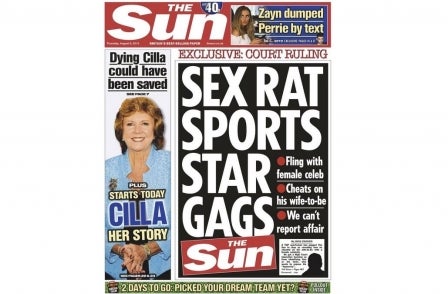
The High Court has prevented The Sun, R, from publishing a story about A1, a "prominent and successful sportsman" married to A2, having an affair with X.
Or, as the newspaper reported it on its front page this morning: "Sex rat sports star gags The Sun".
The News UK title reported the injunction, granted by Mrs Justice Elizabeth Laing, today after the judgment was handed down in court yesterday.
The newspaper reported: "A top sportsman has gagged The Sun to stop us revealing how he cheated on his wife-to-be with a female celebrity.
"He got a High Court injunction banning us from identifying him or his lover, who wants to expose his 'hypocrisy'."
According to the judgment, the sportsman's solicitor made an "urgent application for an injunction" on Friday 31 July.
The injunction was granted after a telephone hearing on the afternoon of Saturday 1 August.
The injunction will remain active until a hearing is held in front of a second judge. Press Gazette understands this is now "months" away.
In her general outline of the facts, Laing said: "A1 is a prominent and successful professional sportsman, who has, from time to time held positions of responsibility in his sport. He appears in advertisements for some products.
"He is now married to A2. He seeks to restrain a national newspaper from publishing a story, to be recounted by X, about a sexual relationship between them. It is common ground that the relationship was some years ago and lasted a few months. At the time of this relationship, he was not married to A2, but she had been his girlfriend for a while. X says, and this has not been specifically denied by A1, that they met at times when he should have been preparing for sports events. She and R now criticise that conduct.
"Some material has been published about X and A1. There is a dispute about whether A2 has contributed to that.
"X now wishes to give her account in order to 'put the record straight'. R's evidence describes the proposed content of the article. It is considerably more detailed and concrete than what has been published so far. Its publication will no doubt cause embarrassment to A1 and A2."
In her judgment, Laing took consideration of articles 8 (privacy) and 10 (freedom of speech).
The judge's conclusion said: "I have analysed the facts at some length. I can state my conclusions briefly. The interference with the article 8 rights of A1 and A2 which is proposed by R and X is not a proportionate means of achieving a legitimate aim…
"I consider now the proposed exercise by R and X of the freedom conferred by article 10. I can also do this briefly, because the facts which are relevant to the two competing Convention rights are, in this case, the same. In the light of my conclusion about article 8, I consider that the grant of an order restraining publication of this material for a short period is a proportionate means of achieving a legitimate aim. I should deal with two further points here.
"First, R argued that the story is already in the public domain. I accept that, depending on the extent and content of any publication, that could mean that it would not be necessary or proportionate, for the purposes of protecting the article 8 rights of A1 and A2, for an injunction to be granted, even for a short time. I have compared the material which is already in the public domain (as summarised in R's witness statements) with the proposed story (also as described in R's evidence). In my judgment, there is a significant gap between what is now public and what would become public if the story were published. It is proportionate, in that situation, to restrain publication of that further material. I should also make clear that, in my judgment, the extent to which there is some material in the public domain is not great enough to mean that damages would be an adequate remedy.
"Second, the As applied for, and I granted, derogations from the principle of open justice. These too, in my judgment, are necessary and proportionate. They will last for a short period, when they can be reconsidered by the court. Without them, the purpose of the application would be defeated, as without them, the parties could be identified."
Email pged@pressgazette.co.uk to point out mistakes, provide story tips or send in a letter for publication on our "Letters Page" blog
